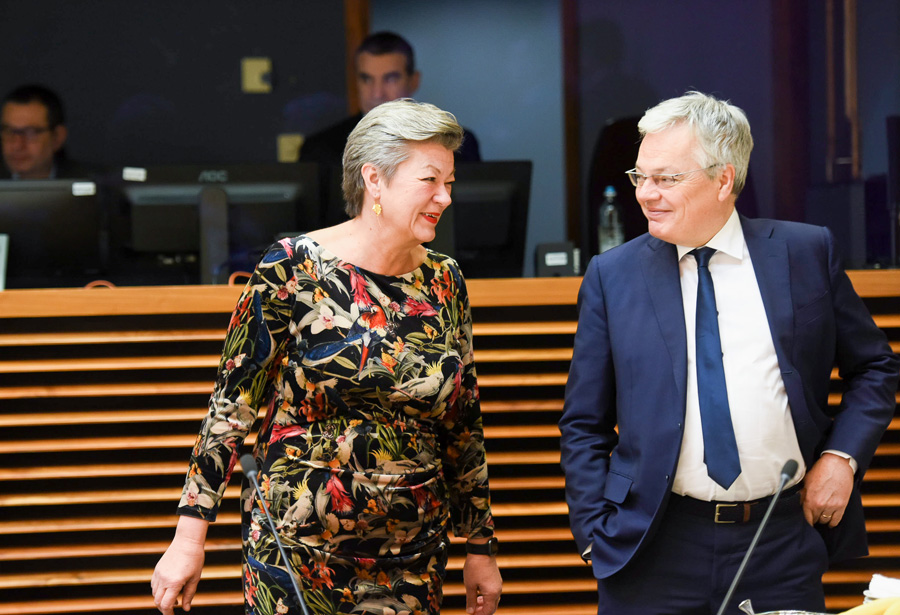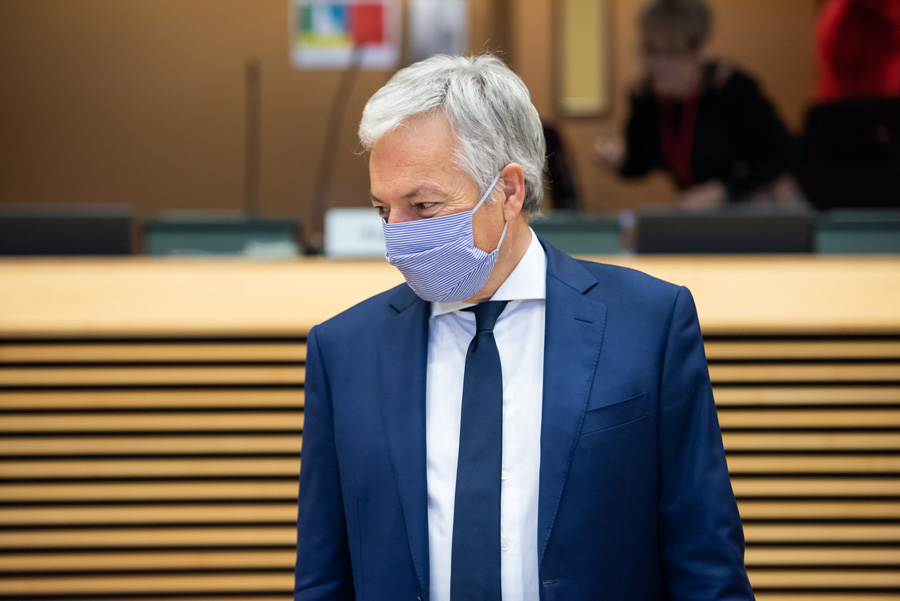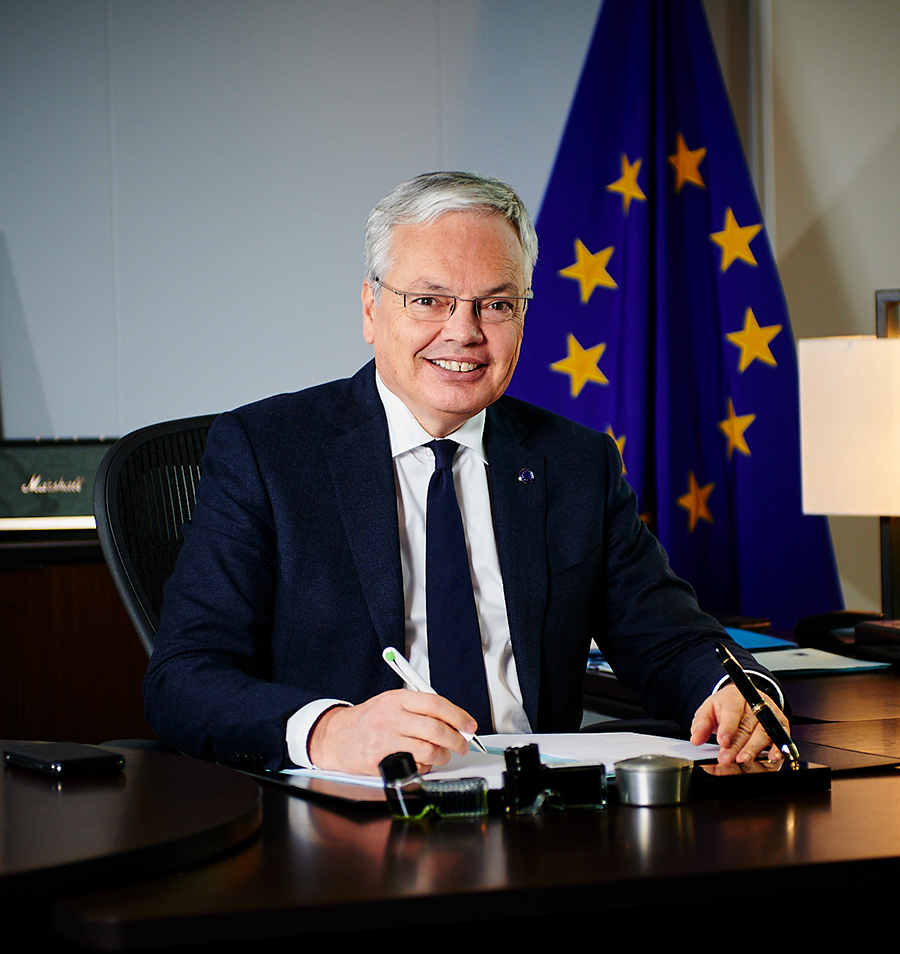Interview
Didier Reynders
European Commissioner for Justice, European Commission
JT: Prior to serving as European Commissioner for Justice, you held various positions in public institutions as minister (without interruption from 1999 to 2019). Having served as Federal Minister of Finance in six different governments, then Federal Minister for Foreign Affairs, Trade and European Affairs in two governments and Minister of Defence, you certainly have federal and supra-national levels.
What are the key priorities in the area of Justice in Europe, and how do they align with the Political Guidelines and supra-national perspective of the European Commission?
DR: My key priorities are to develop European justice systems and judicial cooperation in light of the digital transition, empower consumers in the green and digital transitions, safeguard fundamental rights, and promote the rule of law throughout the European Union.
Respect for the rule of law is at the core of the justice portfolio because all rights stem from it. The rule of law is a “gateway” to all other fundamental rights and the mutual recognition of judicial decisions both in civil and criminal law. To this end, the Commission has established the new comprehensive European Rule of Law Mechanism, a process for an annual dialogue between the Commission, the Council and the European Parliament, the Member States and national parliaments, civil society and other stakeholders.
This new initiative has contributed to the launch of an EU-wide debate on the promotion of rule of law culture, and the annual Rule of Law Report is the foundation of this new process. During the first year of my mandate, I presented the first annual Rule of Law Report, and the second one is planned for July this year.
I am also fully committed to the correct and full implementation of the General Data Protection Regulation and the Directive on Data Protection in Criminal Law Enforcement. We should embrace new technologies. One of my priorities is the protection of fundamental rights in the digital age, including by actively contributing to a coordinated approach on the human and ethical implications of artificial intelligence.
In civil and criminal justice, my priority is to facilitate and improve judicial cooperation between the Member States and develop the justice area. I want to ensure that law enforcement and respect for fundamental rights go hand in hand, especially online.
We need to continue building trust between national legal systems. Citizens’ rights, especially free movement and the rights conferred by European citizenship, are primordial. At this level, during the COVID-19 crisis, I was responsible for guaranteeing the free movement of people, and then I was also involved in the development of EU-wide instruments to help restore freedom of movement. Last year, we worked on tracing apps, and we are now setting up the Digital Green Certificate.
On consumer policy, in November 2019, I presented the New Consumer Agenda, setting out priorities for consumer rights over the next five years. Among other ambitions, the Commission aims to empower consumers in the green and digital transitions. Moreover, I am leading the work on consumer protection, notably for cross-border and online transactions. During these COVID times, there has been far greater reliance on digital transactions, and I have made it my mission to make these more trustworthy.
Moreover, the Justice portfolio has a strong external dimension. I continue to prioritise justice reforms with the European Union’s nearest neighbours, the Western Balkans, Turkey and the Eastern and Southern neighbourhood. Justice policies are interlinked with many other policy areas. For this reason, it is crucial to cooperate and make the best use of all talent within the Commission, in line with the principle of collegiality. Finally, we are now a few days away from starting the operational activities of the European Public Prosecutor Office.

The Commission funds numerous action grants dedicated to awareness raising and support in the practical application of the detention-related Framework Decisions.
JT: Judicial cooperation in criminal matters within the EU is based on the principle of mutual recognition of judicial decisions. Different Council Framework Decisions (1) enable not only detention but also prison sentences, probation decisions or alternative sanctions and pre-trial supervision measures to be executed in an EU country other than the one in which the person is sentenced or awaiting trial.
These are based on the principle of mutual trust, which implies that detention conditions and procedural safeguards are equivalent in all EU Member States. However, there are large discrepancies, which may raise significant fundamental rights concerns.
Furthermore, due to “a lack of awareness and experience thereof, but also because of the burdensome administrative procedures that must be followed” these instruments are not being used by professionals across Members States as expected. (2)
The European Commission promotes the widespread awareness and use of these very important instruments. What is your strategy and plan to overcome low implementation levels by the Member States?
DR: In November 2019, the Council started a peer review (9th round of mutual evaluations), addressing both the three detention related Framework Decisions and the Framework Decision on the European Arrest Warrant (EAW). This 9th round of mutual evaluation, in which the Commission participates as an observer, will be finalised by the end of 2021.
The mutual evaluation will provide added value by offering the opportunity, with on-the-spot visits, to consider not only potential legal issues but especially relevant practical and operational aspects linked to the application of these instruments.
As regards the Framework Decision on Probation and Alternative Sanctions and the Framework Decision on the European Supervision Order, the mutual evaluation will provide insights into the low application of these two Framework Decisions in practice, while suggestions for improvement will also be made.
Organisations who receive operating grants from the Commission, such as the European Organisation for Prison and Correctional Services (EuroPris) and the Confederation of European Probation (CEP) have created specific Experts Groups on the detention-related Framework Decisions, which meet on a yearly basis. The Commission funds numerous action grants dedicated to awareness raising and support in the practical application of these EU instruments.
As regards detention, the Commission recently launched a study on pretrial detention, which will feed into the Commission’s assessment of the need for EU wide rules in this area, for cross border and/or domestic cases. At the request of, and funded by the Commission, the European Union Agency for Fundamental Rights (FRA) launched the Criminal Detention Database in December 2019. The database combines information on detention conditions in all EU Member States in one place.
In parallel, to help enhance mutual trust between Member States, since 2010 the European Union has adopted six directives aiming at a high level of fair trial rights. The Commission is monitoring the effective application of these directives throughout the European Union. The Commission has launched infringement proceedings for lack of full transposition of these directives and has produced implementation reports for the first four directives.
Consolidating a common European judicial culture, based on the rule of law, fundamental rights and mutual trust is one of the flagship actions of the new strategy. The new priorities also include upscaling the digitalisation of justice and going beyond legal education to support the development of professional skills.
JT: On 2 December 2020, the Commission presented its new and ambitious Strategy on European Judicial Training for 2021-2024, one of the two pillars of a package to modernise EU justice systems, side by side with the digitalisation of justice.
The Strategy aims at improving training of justice professionals on EU law. It widens its scope to new topics, target audiences and geographical coverage: it addresses challenges such as the exponential Western Balkans and beyond. digitalisation of societies and the need to reinforce fundamental rights.
For the first time, prison staff and probation officers are a target audience. While focusing mainly on the EU Member States, the strategy also addresses the Western Balkans and beyond.
What would you highlight regarding the objectives, challenges and how the Commission plans to implement the 2021-2024 European Judicial Training Strategy?
DR: EU law only serves citizens if properly implemented. The training of justice professionals on EU law has proved an essential tool for improving the correct and uniform application of EU law and building mutual trust in cross-border judicial proceedings. This is why the Commission has put forward a comprehensive new strategy to respond to the new challenges, such as those brought on by the COVID-19 pandemic, and to support justice systems in the EU.
Moreover, consolidating a common European judicial culture, based on the rule of law, fundamental rights and mutual trust is one of the flagship actions of the new strategy. The new priorities also include upscaling the digitalisation of justice and going beyond legal education to support the development of professional skills. Consequently, more justice professionals should attend training on EU law and training providers should improve the EU law training on offer, whether national or cross-border, EU (co-)funded or not.
This applies to all justice professionals who apply EU law, including primarily judges, prosecutors and court staff, but also professions such as lawyers, notaries, bailiffs, mediators, legal interpreters/translators, court experts, and in certain situations prison staff and probation officers.
The training of prison staff and probation officers is crucial to upholding fundamental rights during detention and consolidating their key role in preventing radicalisation in prisons, and ensuring the success of rehabilitation programmes. At the same time, they also need to be aware of EU policies, in particular on prisoner transfers, probation, alternative sanctions, supervision, drug-related legislation and other issues in prisons.
The strategy includes a new tool, currently in a test phase with recognised EU-level training providers: the European Training Platform (3). It is a search tool for justice professionals who want to train themselves in EU law. It advertises training courses on EU law and training materials for self-learning and used by trainers. I encourage JUSTICE TRENDS Magazine readers to use it.



JT: Following the topic of facilitating and improving judicial cooperation and the development of the justice area, the Mission Letter that the President of the Commission addressed to you states that “(…) you must also study how to make the most of new digital technologies to improve the efficiency and functioning of our judicial systems”. (4)
How do you support accelerated digitalisation of justice systems, especially given that the pandemic may have had a boosting effect in digital transformation processes?
DR: The European Union has supported Member States in their endeavours towards digitalisation of national justice systems for a long time. However, it is true that the difficulties experienced by the justice systems of Member States during the COVID-19 pandemic meant that we had to accelerate the digital transition. I will mention a couple of examples.
Last December, we adopted a Communication on the Digitalisation of Justice in the EU. This strategy outlines the main objectives for the development of a digital European justice and proposes a toolbox of measures to foster the digitalisation of justice both at the national and cross-border level.
With regard to EU financial support, the Recovery and Resilience Facility is our main COVID recovery instrument. I personally called on Member States to plan ambitious digitalisation reforms and investments. Member States could also benefit from the 2021-2027 cohesion policy funds and the Justice programme.
Our support is not only financial, but is also provided through legislative measures to facilitate interoperability between national systems and remove legal barriers to digitalisation. The Commission recently adopted a legislative proposal on sustainable management and maintenance of the e-CODEX system. This system is an essential and important component for the interoperable and secure exchange of information and data between national courts and competent authorities in cross-border judicial proceedings. Member States have free access to e-CODEX.
By the end of this year, the Commission is aiming to table a major reform proposal for the digitalisation of EU cross-border judicial cooperation in civil, commercial and criminal matters. This proposal is a further step in modernising judicial cooperation procedures and in making them more efficient and resilient to crises.
I am confident that the ambitious Commission agenda, and the shared commitment of Member States to bring justice into the new digital era, through better use of technologies, will be to the direct benefit to our citizens, legal practitioners, businesses, and the rule of law as a whole.
JT: The 2021-2024 European Judicial Training Strategy refers to the need to upscale the digitalisation of judicial training and prepare justice professionals to embrace digitalisation and the use of artificial intelligence.
To what extent has European Commission Justice been working on the issues of human and ethical use of artificial intelligence in criminal justice systems?
DR: The Justice services of the Commission have started working on Artificial Intelligence (AI) issues in the context of criminal justice. This work has been recently further developed with the Commission’s adoption of its overall AI framework. This is ongoing, and the Commission recently launched an initiative on a European Approach to Artificial Intelligence.
In the Directorate-General for Justice, we held a preliminary Expert Group meeting during which we covered various issues, such as criminal liability and fundamental rights and data protection aspects. Once the Commission’s AI Framework has been finalised, we plan to deepen our work on AI in the judicial and law enforcement context.
AI is crucial for our century. It can bring major benefits for society and the economy, but also risks. This why it is important to have a coordinated European approach to AI. We must develop policies that protect individuals - a human centric approach that also allows Europe to be competitive in the AI landscape. AI applications must comply with fundamental rights.
The General Data Protection Regulation already protects personal data. It is now essential to shape a framework that addresses possible challenges to human dignity, non-discrimination, equality, freedom of expression and other fundamental rights. This is why, a few weeks ago, I actively contributed to the preparation of legislation for a coordinated approach on the human and ethical dimension of AI.
Regulation and development of AI must go hand in hand. Developing AI based on shared European values can be a competitive advantage as trust is a very important factor for the uptake of the development and use of new technologies. Business interests and fundamental rights converge when it comes to creating sustainable AI business models. We need the right kind of innovation. I am in favour of an approach that promotes the rollout of AI by creating legal certainty and investment stability while establishing societal acceptance and trust.



JT: In her 2020 State of the Union address, President Ursula Von der Leyen announced the New European Bauhaus (NEB) as the recent European Commission initiative to lead a paradigmatic shift in lifestyle, and industrial and entrepreneurial activity in response to mounting climate and environmental threats.
The new initiative aims to stimulate public and business mindsets to life, work, and building concepts based on sustainability, inclusiveness, aesthetics, quality of experience, protecting the climate and preserving biodiversity.
The whole idea revolves around community, accessibility, circularity, affordability, simplicity, creativity, art, culture experimentation, connection, togetherness and socio-economic and gender equality. The European Commission highlights the purpose of a living movement.
How do you envisage the involvement of the justice sector in the New European Bauhaus initiative – how do you see the NEB’s main concepts (of beauty, sustainability and togetherness) being applied to justice systems across the EU, including prison and probation administrations?
DR: The New European Bauhaus (NEB) is the Commission’s creative and interdisciplinary movement. It aims to bring citizens, experts, businesses, and institutions together and facilitate conversations about making tomorrow’s living spaces more affordable and accessible. It is a plan for the future, and we are only at the early stages.
The NEB will highlight the value of simplicity, functionality, and circularity of materials without compromising the need for comfort and attractiveness in our daily lives. It will provide financial support to innovative ideas and products through ad hoc calls for proposals and through coordinated programmes included in the long-term EU budget.
The approach will be one of social inclusion: nobody left behind, removal of barriers faced by people, improving living conditions for all citizens. I can see how this approach would be attractive to architects and designers of prisons and other public justice buildings (such as courts and police stations) which have traditionally been functional and sometimes grim.
There are some notable exceptions, such as the magnificent new court building in Antwerp, which has environmental features as well as an emphasis on transparency. The NEB movement will make funds available and will offer prizes to create incentives for designers of public buildings who incorporate the principles of sustainability, inclusion and aesthetics into their concepts.
(1) 2002/584/JHA on the European arrest warrant and the surrender procedures between Member States;
2008/909/JHA on the application of the principle of mutual recognition to judgments in criminal matters imposing custodial sentences or measures involving deprivation of liberty for the purpose of their enforcement in the European Union;
2008/947/JHA on the application of the principle of mutual recognition to judgments and probation decisions with a view to the supervision of probation measures and alternative sanctions;
2009/299/JHA amending Framework Decisions 2002/584/JHA, 2005/214/JHA, 2006/783/JHA, 2008/909/ JHA and 2008/947/JHA, thereby enhancing the procedural rights of persons and fostering the application of the principle of mutual recognition to decisions rendered in the absence of the person concerned at the trial;
2009/829/JHA on the application, between Member States of the European Union, of the principle of mutual recognition to decisions on supervision measures as an alternative to provisional detention.
(2) European Judicial Network. (2019). Report on activities and management 2017-2018. European Union.
(3) European Training Platform
(4) von der Leyen, U. (1 Dec 2019). Mission letter Didier Reynders, Commissioner for Justice.
Didier Reynders
European Commissioner for Justice, European Commission
Didier Reynders became European Commissioner for Justice, responsible for the rule of law and consumer protection, in December 2019. Reynders, a Belgian national, has held several high-level political positions in his country, including Deputy Prime Minister (2014-2019), Minister of Foreign and European Affairs (2014-2019) – a portfolio that he accumulated with that of Minister of Defence between 2018 and 2019 –, Minister of Foreign Affairs, Foreign Trade and European Affairs (2011-2014) and Minister of Finance (1999-2011). Moreover, from 2004 to 2011, he chaired the Mouvement Réformateur (liberal party alliance). He was elected a Member of Parliament in 1992. Before that, he chaired the Belgian Railway Company and the National Society of Airways. He holds a law degree from the University of Liège (1981).


